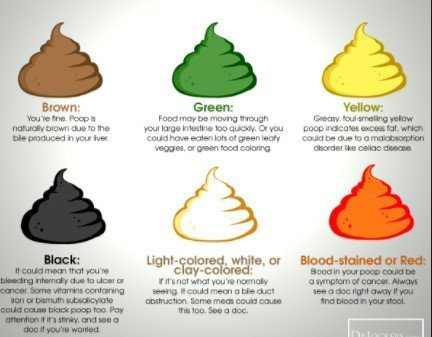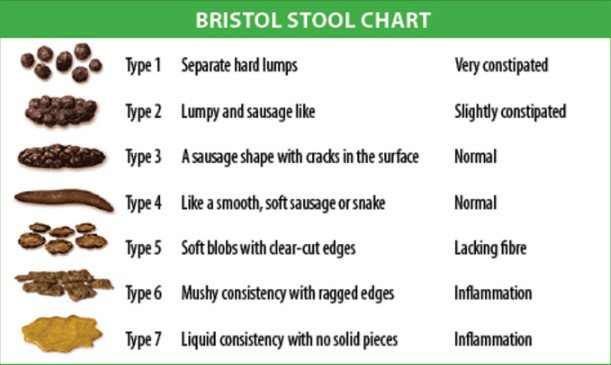The color of your poop says a lot about your health. But is dark brown stool normal? Poop, stool or feces are solid waste humans eliminate. This solid waste forms the end-product of digestion. It is made of water, bacteria, protein, fat, fiber, and other organic solids.
The color, texture, and maybe the smell of your poop will vary depending on these components, which vary based on an individual’s diet and health status. For a healthy person, it takes approximately 18-72 hours for food to become poop. The process is known as intestinal transit time. It can shorten in case of diarrhea or lengthen in case of constipation.
Here is what the color of your poop means during pregnancy, what symptoms to expect, and how to treat the underlying conditions cause the poop color and texture changes.
What the color of your stool means

What is considered a normal stool will often vary from person to person. This depends on the person’s general health and the food they eat. So what is considered a normal stool? According to Michael F. Picco, MD, at Mayo Clinic, normal stool color includes any shade of brown or green.
A light to dark brown stool is, therefore, quite normal. Any color or texture change should, however, be evaluated if it persists for more than two days. Generally, your stool color is influenced by what you eat, as well as by the amount of bile. Rarely stool color indicates a serious intestinal condition.
According to the mayo clinic, this is what the color of your stool means:
1. Green poop
Green poop means that food might be moving too quickly in the large intestine. As a result of this, the bile does not have enough time to break down completely. This is common in people suffering from chronic diarrhea.
Most of the time, green poop s considered normal. It often results from:
- Taking iron supplements
- Eating a lot of vegetables and green food coloring.
2. Black stool
For babies, it is common for them to have black stool a few days after they are born. For adults, the black stool can be caused by eating dark-colored food or taking food supplements that cause black stool.
Food, medicine, and food supplements that cause black poop will include iron supplements, black licorice, blueberries, and bismuth subsalicylate.
Black stool can also be a sign of a serious underlying condition such as bleeding in the upper part of your digestive tract. We recommend you have the condition evaluated as soon as possible to prevent any complications.
3. Yellow greasy, foul-smelling poop
It is especially common for breastfeeding babies. Yellow greasy, foul-smelling stool in both adults and children can be a sign of too much fat. It indicates that your body is not digesting food properly.
Yellow greasy stool with a foul odor can be seen in people who have celiac disease. The body cannot handle gluten; this kind of stool can be seen if they eat bread, pasta, and other sources of this protein.
4. Light-colored, white or clay stool
Light-colored stool or white poop may be a sign of lack of bile in the stool. White or clay poop indicates a bile duct obstruction.
According to WebMD, clay poop can also be a result of taking diarrhea medicine like bismuth subsalicylate. The same can also occur from drinking barium, a chalky liquid you drink before you get an X-ray of the upper part of your digestive tract.
5. Bright red stool
A normal cause of bright red stool is eating red foods. If you notice a red poop and you have not taken any red diet, then the bright red color you see in your stool could be blood.
A bright red stool may be a sign of bleeding in the lower parts of your digestive tract. The bleeding might be a sign of the following conditions:
- Cancer or noncancerous tumor of the digestive tract
- Inflammation in the colon
- Hemorrhoids or piles
- Growth in your colon known as polyps
- Intestinal injuries (anal fissures, tumor, ulcers, excess straining)
Stool color chart
Bristol stool scale or Bristol stool chart is a diagnostic medical tool designed to classify forms of human poop into different categories to be used in the medical examination of what the underlying causes might be.

Causes of dark brown stool
Tarry or bloody stool is used to describe a sample of stool that is either dark red or black I color. A black or dark brown stool can indicate bleeding or other injuries in your gastrointestinal tract; this is especially if the dark color is not as a result of eating dark-colored foods.
Black, tarry, or brown stool can be caused by bleeding in the upper portion of your digestive system. The bleeding can be as a result of ulcers, or other forms of irritation in your esophagus. The blood mixes with your digestive fluids and takes an appearance of tar.
A dark stool can also result from taking certain medications. Common such medication includes iron supplements and bismuth-based medication.
In rare cases, serious blood and circulation abnormalities in your digestive tract can be the cause of the dark brown, black, or tarry stools. Some of these complications will include:
- Reduced blood flow to the intestine medically known as bowel ischemia
- Protruding veins in the intestine and
- Vascular malformation or misshapen veins
Dark brown stool during pregnancy
There are a lot of changes introduced to nearly every system during pregnancy. In most of the cases, dark stool during pregnancy will often be accompanied by constipation. This depends on what the actual underlying cause is.
During pregnancy, common causes of dark brown stool will include:
- Taking an iron supplement prescribed to correct anemia or low red blood cells count common during pregnancy.
- Taking certain over the counter medicines during pregnancy may upset the stomach and cause dark stool.
- Eating foods such as licorice and blueberries can also be the underlying cause of dark stool during pregnancy. If the dark stool persists for more than three days after eating the said foods, please visit your doctor.
- Dark stool during pregnancy can also be caused by bleeding that occurs in the stomach. Your healthcare provider may prescribe a special test to check for the presence of blood in the stool.
- Constipation caused by lack of fiber, taking certain medication, or not drinking enough fluids can also change the color and texture of your poop.
Symptoms
As mentioned, the color, texture, and smell of your poop will depend on your general health condition and what you eat. How often you have your bowel movements can be influenced by a lot of things, most of which are often nothing to worry about.
Remember, the color, shape, texture, and general appearance of your stool say a  lot about your health. It is not odd to look at it before you flush it away.
lot about your health. It is not odd to look at it before you flush it away.
Even though a wide variety of stool color, texture, and general appearance can be considered normal, there as something that, when seen, warrants an urgent medical evaluation. Some of these will include:
1. Dark brown stool with blood
Dark brown stool with blood can be a sign of stomach ulcers. Also known as gastric ulcers, these are painful sores in the stomach lining. It is a type of peptic ulcer that affects both the stomach lining and the small intestine.
According to the health line, stomach ulcers are almost always caused by an infection with Helicobacter pylori bacterium and long-term use of nonsteroidal anti-inflammatory drugs.
2. Black stool and stomach pain
Black poop and stomach pain or cramps can be caused by gastrointestinal bleeding, IBS, intestinal ileus, and inflammatory bowel disorder.
The severity of the symptoms will often depend on how severe the condition is. Treating the stomach pan will depend on what the underlying cause is. Urgent treatment is recommended to prevent serious complications.
3. Dark brown stool with mucus
A small amount of mucus in stool can be considered normal. But when you notice too much of mucus, it can be a sign that something is wrong.
During digestion of food, mucus is secreted to moisten and lubricate the inside of the colon. This helps the poop pass through easily with minimal straining. The increased amount of mucus in stool can be a sign of cancer, Ulcerative colitis or Crohn’s disease, or a possible intestinal infection.
Dark brown stool with mucus can also result from diarrhea. An urgent medical examination is required to identify and treat the underlying cause of such symptoms.
4. Dark brown dry stool
Most of the time, the dry stool will indicate decreased fiber in your diet. During digestion, fiber passes through the body relatively unchanged. Though fiber is an important part of the diet, adding too much of it can cause loose stool. Increased fiber in your diet pushed food and waste through the digestive tract very quickly.
The United States library of medicine notes that, occasionally, the dark stool can be caused by minor problems such as consuming black licorice, lead, iron supplements, among others.
After consuming the said products, it is fairly common to notice a darkened stool within a day or two. If you still have a dark stool after the third day, then it might not be as a result of the said foods. This could be a sign of an underlying condition that needs to be evaluated as soon as possible.
5. Loose and dark stool
The loose and dark stool might be a sign of serious underlying infections in your digestive tract. A variety of infections caused by bacteria, viruses, or parasites can arise within your digestive tract. In most people, the common cause of these infections is taking contaminated foods.
In cases of such infections, your body will produce toxins that help fight the infection. The toxins then trigger the release of water that your body tries to push out as fast as possible to get rid of the infection. The toxins will then produce the dark color in your stool, whereas the extra water causes the loose structure of the stool.
A loose and dark stool can also result from serious conditions that result in a significant amount of digested blood in the stool. Some of these conditions include liver disease, ruptured blood vessels along the digestive tract, and stomach cancer, among other conditions.
Treatment
When the dark brown stool is caused by an underlying medical condition affecting your digestive tract, then the best way to handle it is to have the said condition treated. Your healthcare provider will need to perform some medical examination to identify the cause, after which the most appropriate prescription will be made.
Constipation and diarrhea can also affect the color, texture, and odor of your stool. These two conditions affect the intestinal transit time. There are some things you can do to help improve your bowel movements.
You need to do the following:
- Drink plenty of water and increase your consumption of fresh fruits and vegetables. This will help you stay hydrated. It ensures effective digestion of food by preventing diarrhea and constipation.
- Cut down on processed foods. you also need to avoid foods that contain a lot of sugar and chemical additives
- Make sure to maintain a healthy balanced diet. Increase your consumption of fiber for proper digesting. When your body is healthy, you can stop worrying about abnormal stool color.
- You also need to exercise regularly. This will ensure proper and efficient digestion and absorption of food by your body.
References:
- Stool color: when to worry: http://www.mayoclinic.org/stool-color/expert-answers/faq-20058080
- What do different poop colors mean? http://www.webmd.com/digestive-disorders/what-do-different-poop-colors-mean#1
- What it means when your stool changes color, texture, and form: http://www.medicinenet.com/stool_color_changes/article.htm
- Black, green or bloody, what the color of your poop means: https://www.dietvsdisease.org/poop-stool-color/
- What it means when you have loose & dark stool: http://www.livestrong.com/article/518733-dark-stool-from-iron-in-food/

